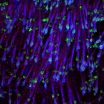(Press-News.org) An organism is healthy thanks to a good maintenance system: the normal functioning of organs and environmental exposure cause damage to tissues, which need to be continuously repaired. This process is not yet well understood, but it is known that stem cells in the organs play a key role, and that when repair fails, the organism ages more quickly. Researchers from the Spanish National Cancer Research Centre (CNIO) have "discovered one of the key genes that make up the maintenance mechanism for tissues" says Miguel Foronda, the first author of the manuscript.
The study is published this week in the journal Cell Reports. The authors believe that it adds another piece to the ageing, stem cells and cancer puzzle, made up of three main elements that are known to be related, but no one knows exactly how. By understanding this relationship throughout identification key regulatory genes, we could have a different, perhaps more unified, vision of these three areas with enormous implications for health.
The target of this research, the Sox4 gene, is expressed during embryonic development —it contributes, for example, to the development of the pancreas, the bones and the heart, and to the differentiation of lymphocytes. It is also active in the adult organism, but in a very limited way, being mainly restricted to some stem cell compartments.
Furthermore, when Sox4 malfunctions it becomes an oncogene. Practically all human cancers have too much Sox4, which translates into more cellular proliferation and less apoptosis—programmed cell death; a mechanism that protects against cancer. It is also known that Sox4 plays a role in metastasis.
Both of these facts—that Sox4 is expressed only in some cells in the adult organism, and that it favours cancer development when there is too much of it—indicate that Sox4 is a powerful gene, with important consequences if it is not properly regulated. The CNIO group, therefore, wanted to study more in depth the role of Sox4 in the adult organism.
It was not an easy task, because mice in which Sox4 had been eliminated die before birth. The authors' working strategy consisted of generating a line of mice that do express Sox4, but at lower quantities than normal.
These animals survive and are fertile, but they have several peculiarities: they are smaller than normal, age earlier and do not have cancer. Conversely, they do develop other age-related illnesses.
As stated by the researchers, the mice with less Sox4: "show signs of premature loss of tissue homeostasis (maintenance), shorter telomeres, and, as a consequence, accelerated ageing and the appearance of pathologies associated with ageing, as well as cancer resistance."
The mice deficient in Sox4 have, for example, little bone regeneration and lots of osteoporosis, indicating that this gene is important for the bone tissue maintenance mechanism.
But the authors wanted to especially investigate whether stem cells were the key actors in these consequences of lowering Sox4 levels. To this end, they created more mice in which this gene was completely deactivated in hair follicle stem cells; those responsible for the regeneration of the epidermis. In these mice, precisely, the skin repair mechanism did not work, the skin aged prematurely and they did not develop skin cancer.
The puzzle has not yet been solved: why these animals are less likely to have cancer?. One possible explanation is that a lower rate of tissue regeneration —given than the stem cells are less active in the absence of Sox4— is a cancer-inhibiting mechanism.
As Maria Blasco, the co-author, says: "this would imply that the origin of cancer is associated to regeneration errors, and if there is less regeneration there is also less cancer. The negative side is that less renewal also means more ageing. It is a complex balance, which we will only understand with more research."
INFORMATION:
This study was funded by the Ministry of Economy and Competitiveness, the European Union, the Community of Madrid, the AXA Foundation, and the Botín Foundation.
Reference article:
Foronda et al., Sox4 Links Tumor Suppression to Accelerated Aging in Mice by Modulating Stem Cell Activation, Cell Reports (2014), http://dx.doi.org/10.1016/j.celrep.2014.06.031
CNIO researchers discover a gene that links stem cells, aging and cancer
2014-07-17
ELSE PRESS RELEASES FROM THIS DATE:
First ab initio method for characterizing hot carriers
2014-07-17
One of the major road blocks to the design and development of new, more efficient solar cells may have been cleared. Researchers with the Lawrence Berkeley National Laboratory (Berkeley Lab) have developed the first ab initio method – meaning a theoretical model free of adjustable or empirical parameters – for characterizing the properties of "hot carriers" in semiconductors. Hot carriers are electrical charge carriers - electrons and holes – with significantly higher energy than charge carriers at thermal equilibrium.
"Hot carrier thermalization is a major source of ...
Untangling spider's webs
2014-07-17
For decades, the story of spider evolution went like this: As insects became more and more diverse, with some species taking to the skies, spiders evolved new hunting strategies, including the ability to weave orb-shaped webs to trap their prey.
From that single origin, the story goes, orb-weaver spiders diverged along different evolutionary paths, leading to today, where several species weave similar – though not identical – webs.
It's a good story, but there's just one problem – Harvard scientists now know it's not true.
The largest-ever phylogenetic study of ...
Eye movements reveal difference between love and lust
2014-07-17
Soul singer Betty Everett once proclaimed, "If you want to know if he loves you so, it's in his kiss." But a new study by University of Chicago researchers suggests the difference between love and lust might be in the eyes after all.
Specifically, where your date looks at you could indicate whether love or lust is in the cards. The new study found that eye patterns concentrate on a stranger's face if the viewer sees that person as a potential partner in romantic love, but the viewer gazes more at the other person's body if he or she is feeling sexual desire. That automatic ...
Atlantic salmon also show capacity to adapt to warmer waters
2014-07-17
Populations of Atlantic salmon have a surprisingly good capacity to adjust to warmer temperatures that are being seen with climate change, a group of scientists at the University of Oslo and University of British Columbia have discovered. The finding about Atlantic species adds to recent UBC-supported research on heat tolerance of Pacific salmon.
The new study, a collaboration between Norwegian and Canadian researchers, was recently published in Nature Communications. Funded by the Norwegian Research Council, it addressed questions around how climate change might affect ...
Eating lean beef daily can help lower blood pressure
2014-07-17
Contrary to conventional wisdom, a growing body of evidence shows that eating lean beef can reduce risk factors for heart disease, according to recent research by nutritional scientists.
"This research adds to the significant evidence, including work previously done in our lab, that supports lean beef's role in a heart-healthy diet," said Penny M. Kris-Etherton, Distinguished Professor of Nutrition, Penn State. "This study shows that nutrient-rich lean beef can be included as part of a heart-healthy diet that reduces blood pressure, which can help lower the risk for cardiovascular ...
Gut microbes turn carbs into colorectal cancer
2014-07-17
Colorectal cancer has been linked to carbohydrate-rich western diets, but the underlying mechanisms have been unclear. A study published by Cell Press July 17th in the journal Cell shows that gut microbes metabolize carbohydrates in the diet, causing intestinal cells to proliferate and form tumors in mice that are genetically predisposed to colorectal cancer. Treatment with antibiotics or a low-carbohydrate diet significantly reduced tumors in these mice, suggesting that these easy interventions could prevent a common type of colorectal cancer in humans.
"Because hereditary ...
Brown fat found to be at the root of cancer-related wasting syndrome
2014-07-17
VIDEO:
Many patients with advanced stages of cancer, AIDS, tuberculosis, and other diseases die from a condition called cachexia, which is characterized as a "wasting " syndrome that causes extreme thinness with...
Click here for more information.
Many patients with advanced stages of cancer, AIDS, tuberculosis, and other diseases die from a condition called cachexia, which is characterized as a "wasting" syndrome that causes extreme thinness with muscle weakness. ...
Obese women may have learning deficit specific to food
2014-07-17
Obese women have a deficit in reward-based learning, but only when food is involved. Importantly, say researchers who report their findings in the Cell Press journal Current Biology on July 17, those same women have no trouble at all forming accurate associations when the reward is money instead of food. The findings may lead to new, gender-appropriate ways to tackle the obesity epidemic.
"Our study shows that obesity may involve a specific impairment not in the processing of food itself, but rather in how obese individuals—or at least obese women—learn about cues in ...
Study identifies molecular key to healthy pregnancy
2014-07-17
Scientists have identified a crucial molecular key to healthy embryo implantation and pregnancy in a study that may offer new clues about the medical challenges of infertility/subfertility, abnormal placentation, and placenta previa.
Multi-institutional teams led by researchers at Cincinnati Children's Hospital Medical Center report their results in Cell Reports on July 17. The authors found that uterine expression of a gene called Wnt5a – a major signaling molecule in cell growth and movement in both embryo development and disease – is also critical to healthy embryo ...
First comprehensive library of master genetic switches in plants
2014-07-17
Researchers have created the first comprehensive library of genetic switches in plants, setting the stage for scientists around the globe to better understand how plants adapt to environmental changes and to design more robust plants for future food security.
The collection, which took more than 8 years and $5 million to create, contains about 2,000 clones of plant transcription factors, nature's genetic on/off switches. Manipulating these transcription factors enables scientists to improve plant traits such as cold resistance or seed quantity. The research will be published ...



